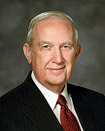The Power of Scripture, by Richard G. Scott
Of the Quorum of the Twelve Apostles

I value the friendships that I share with people from the wide spectrum of belief. Some of my friends can't understand why I believe in a loving God when so much pain and suffering exists in the world; others believe in a loving God, but can't understand why I believe in modern prophets and apostles when the Bible is all they say they need. As I reviewed Elder Scott's words (he's one of the modern apostles) on the power of scripture, I thought of other friends I have who are harder to classify in the belief spectrum.

I started a thread on a religious forum asking about agency that somehow transformed to a discussion on Trinitarianism (Christians who believe in the Trinity) compared with the LDS view of a Godhead (where Father, Son, and Holy Ghost are united in purpose, but separate entities). The virtues and power of the Bible were expressed from both sides, but the non-LDS participants united in saying that there is no communication from heaven after the Bible's recorded words because there is no need. The heavens, they say, are closed with regard to prophets—but can be "opened" when receiving instruction from Bible passages.
When I consider the idea of heavenly silence, I can't help but think of darkness and confusion. Elder Scott shared insight that is helpful here:
Scriptures are like packets of light that illuminate our minds and give place to guidance and inspiration from on high.

You may say, "But others in your 'closed heaven' camp likewise find light in the scriptures." True, but Elder Scott continued and illustrated the bigger picture for me:
They [the scriptures] can become the key to open the channel to communion with our Father in Heaven and His Beloved Son, Jesus Christ.
. . . Pondering a passage of scripture can be a key to unlock revelation and the guidance and inspiration of the Holy Ghost.
As we turn to the scriptures and ponder what God has said to others—or see how His hand has influenced others' lives—we can align ourselves to receive direct, personal revelation to bless our lives.
We rightly seek advice from friends in times of need. Elder Scott spoke of the scriptures as being our friends:
Learning, pondering, searching, and memorizing scriptures is like filling a filing cabinet with friends, values, and truths that can be called upon anytime, anywhere in the world.
I'm grateful for all my friends—even those who don't agree with me religiously (but I don't usually keep them in a filing cabinet). The social media explosion where so many are reconnecting with friends from the past is an example of how much society values friendship.
If scriptures are like friends, then I should spend more time reading their status updates. If scriptures are like friends, then I shouldn't leave them sitting on the shelf when a crisis presents itself. If scriptures are like friends, then I should introduce them to people I meet.
I like the idea of scriptures being friends. But where do you think they sit on the belief spectrum...?



0 thoughts
Post a Comment